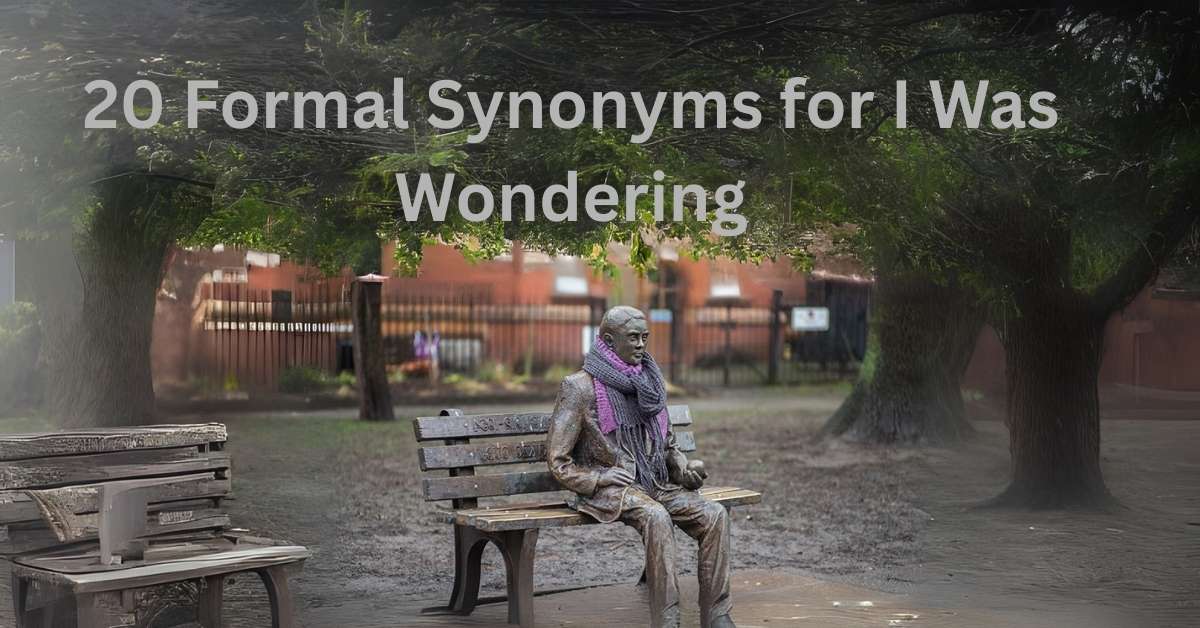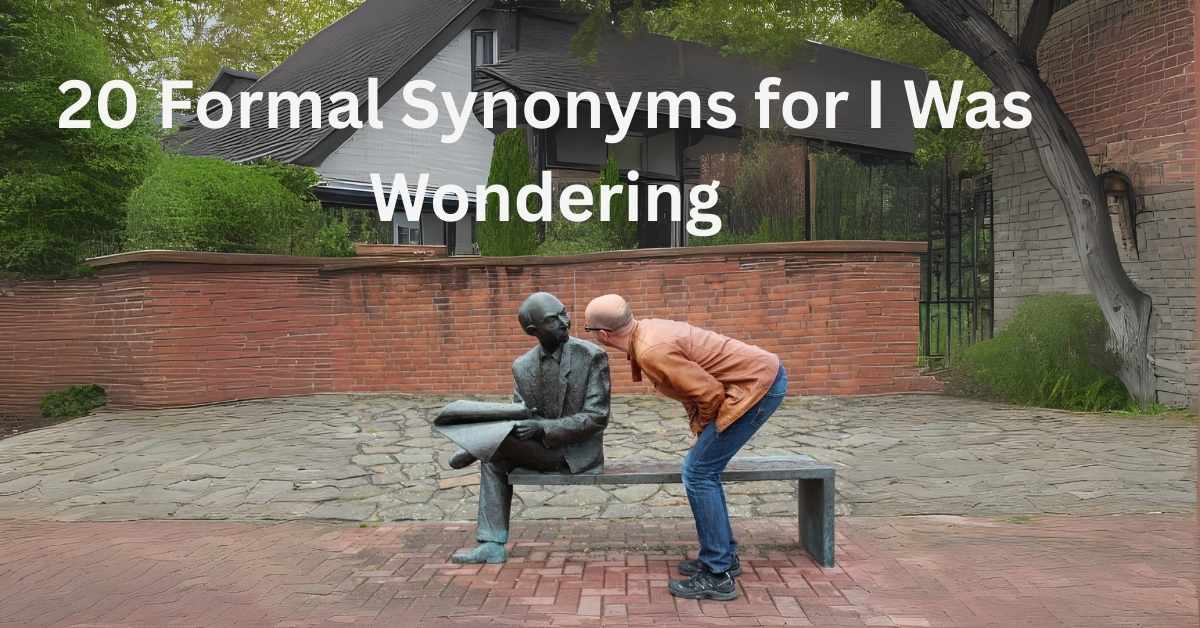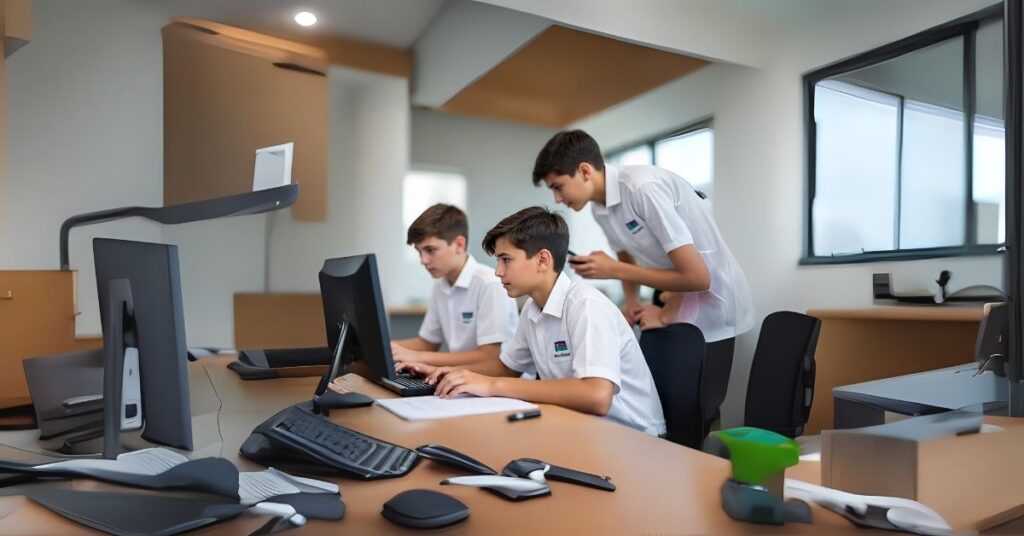Looking for the right words can feel tricky in professional settings. Simple phrases like “I was wondering” often sound too casual in emails, meetings, or academic writing. That’s where formal synonyms for I was wondering make all the difference. They help you express curiosity while keeping your tone respectful, clear, and professional.
Using formal synonyms for I was wondering shows that you value good communication and workplace etiquette. These expressions bring clarity and make your requests sound polished. Whether you’re writing to a manager, professor, or client, choosing the right phrase builds trust and keeps your conversations natural yet professional.
If I Might Inquire
This phrase works best when you want to maintain a formal tone while keeping your sentence polite and natural. It highlights your respect for the other person’s time and knowledge. You can use it in emails where you address a client, a manager, or even a professor. For example, instead of simply saying “I was wondering if you could explain this,” you might write, “If I might inquire about the project timeline, I’d appreciate your guidance.” This small change in diction adds a touch of polite inquiry and sets a professional tone.
The strength of this formal phrase lies in how it signals seriousness. By using inquiry, you show that you are not just asking casually, but rather making an official request for information. It works well in professional communication strategies, from business emails to academic writing, where tone and etiquette matter.
also reaide: other ways to say happy monday
May I Seek Clarification

When you write to a teacher, manager, or client, there are moments when you need more details. Instead of saying, “I was wondering if you could explain this,” you could say, “May I seek clarification on this point?” The word clarification shows that you want precise information and that you respect the other person’s expertise. It turns your request into a polite and professional expression of curiosity.
Using this formal phrase creates balance in communication. It avoids sounding demanding and instead highlights your interest in understanding. It’s a great way to keep the conversation flow smooth and natural while making sure the tone remains formal. This style of indirect speech reflects strong workplace culture where respect and clarity go hand in hand.
I Would Like to Ascertain
This phrase is excellent when you want to show determination to understand something fully. To ascertain means to investigate, evaluate, or determine facts. For example, you could say, “I would like to ascertain whether the meeting will be held next week.” Such wording carries weight because it combines curiosity with formality.
In academic and professional contexts, this phrase reflects seriousness and attention to detail. It works perfectly when you want to sound precise while seeking information. The polite tone of this request makes it suitable for emails to colleagues, teachers, or clients where professional interaction is expected.
Could I Pose a Question
This phrase directly states your intention but in a respectful manner. Instead of casually slipping a question into your message, you acknowledge the importance of asking it. Saying “Could I pose a question regarding the financial report?” gives your communication a respectful and professional edge.
This phrasing is especially useful in conversations with professionals or recipients who hold authority, such as managers or professors. It makes the dialogue structured while maintaining an engaging and natural flow. The rhetorical style of this formal phrase highlights that you value the exchange of knowledge.
If I Could Inquire
Using “If I could inquire” is another variation that softens your request while keeping it formal. It shows politeness by making the question conditional, giving the other person space to respond at their comfort. For example, you might say, “If I could inquire about your availability next week, that would help me plan ahead.”
This phrase reflects professional respect and creates an indirect yet clear way of seeking information. It’s a substitution for “I was wondering” that works well in official correspondence, where polite formality and tone are crucial.
May I Request Information

This expression is straightforward and professional. It’s perfect for times when you need facts, numbers, or details, such as requesting documents, deadlines, or policies. For instance, you could write, “May I request information regarding the updated project schedule?” It’s respectful, clear, and leaves no room for confusion.
In workplace communication, especially in business emails or academic exchanges, this formal synonym adds precision. It respects the professional hierarchy and makes the recipient feel that their knowledge is valued.
I’m Interested in Knowing
This phrase strikes a softer tone while still maintaining formality. It shows curiosity without being overly demanding. For example, saying, “I’m interested in knowing more about the training program” makes the request polite and respectful.
It’s particularly useful in professional networking, client interactions, or even student-teacher conversations. It blends curiosity and professionalism, creating a polite request that feels natural in both written and spoken dialogue.
Would It Be Acceptable to Ask
This phrase carries a tone of humility and respect. By using the word acceptable, you show awareness of workplace etiquette and hierarchy. For example, “Would it be acceptable to ask for a brief extension on the project?” acknowledges authority and presents your request politely.
It is well suited for professional communication strategies, especially when speaking with managers, professors, or senior colleagues. This careful choice of wording signals politeness and helps maintain strong workplace culture.
Might I Inquire
This refined version of inquiry is ideal for situations that require a more elegant touch. “Might I inquire about the company’s new policy?” not only sounds polite but also professional. It feels more formal than casual questioning.
This phrase works in both spoken and written communication. It reflects an awareness of style, phrasing, and professional diction, making it suitable for academic, business, or official contexts.
Could You Enlighten Me
This phrase has a slightly academic or literary tone. For instance, saying, “Could you enlighten me on the reasoning behind this strategy?” sounds respectful while encouraging detailed explanation.
Although it carries a more intellectual style, it still works well in professional conversations where curiosity and respect for the other person’s expertise are highlighted. It reflects curiosity combined with professional etiquette.
I’m Curious to Know
This phrase is formal yet warm. It’s often used when you want to express genuine curiosity in a way that still respects the professional setting. For example, “I’m curious to know how the new system will affect workflow” sounds both approachable and respectful.
This formal phrase blends curiosity and politeness, making it useful in many communication contexts such as meetings, emails, or academic discussions. It is a polite formality that keeps your wording choice engaging and natural.
If I May Seek Your Input
Collaboration often requires polite requests for opinions. Saying, “If I may seek your input on this proposal” shows humility and respect. It also makes the recipient feel valued as their knowledge is being recognized.
This phrase is excellent in teamwork situations where employee contributions matter. It represents polite inquiry and smooth dialogue exchange, strengthening both communication flow and workplace culture.
Would It Be Possible to Clarify
This phrase is powerful when you need to resolve confusion. For example, you might write, “Would it be possible to clarify the details of tomorrow’s meeting?” It asks politely while avoiding any demanding tone.
In business and academic writing, it’s an alternative form that directly connects with clarity and explanation. It shows respect for the recipient’s role while requesting precise information.
May I Seek Your Guidance
This phrase emphasizes mentorship and professional respect. Writing, “May I seek your guidance regarding this issue?” communicates that you value the other person’s expertise and are open to learning.
It is especially effective when addressing professors, managers, or mentors. It signals curiosity and willingness to understand, fitting perfectly in academic and workplace communication strategies.
I Am Keen to Understand
This phrase highlights eagerness and motivation. For example, “I am keen to understand the details of the new policy” shows strong interest in gaining knowledge.
It’s often used in research or academic contexts but also fits into business communication where analysis and evaluation are key. It combines curiosity with formality, creating a respectful tone.
If I Could Solicit Your Input
This phrase carries a high level of formality. It works best in business or academic proposals where you request feedback. For example, “If I could solicit your input on the strategy document, I’d be grateful.”
It frames the recipient as someone with valuable knowledge, creating a polite tone that emphasizes respect and collaboration.
Could You Provide Insight
When you need more than just clarification, this phrase works well. For example, “Could you provide insight into the market trends?” encourages detailed and thoughtful responses.
This phrase fits best in professional or consulting contexts, where comprehension and deeper explanation are expected. It reflects respect for the recipient’s knowledge and experience.
I’m Seeking Information On
Sometimes you need to be direct but still formal. Saying, “I’m seeking information on the registration process” communicates your intent clearly without sounding casual.
It works well in business emails, academic correspondence, or customer service communication. The clarity of this phrase makes it easy to use in structured conversations.
Would It Be Permissible to Ask
This phrase is highly respectful, showing awareness of authority and conditions. For example, “Would it be permissible to ask for additional resources?” makes your request polite while emphasizing permission.
It is often used in workplaces where hierarchy is strong or in academic contexts where formal communication is expected.
If I Might Seek Your Expertise
This phrase positions the recipient as a knowledgeable authority. Saying, “If I might seek your expertise on this technical issue” highlights your respect for their skills.
It’s a powerful synonym for “I was wondering” because it frames the request as both professional and respectful. It works especially well in academic, legal, or technical fields where expertise matters most.
Conclusion
When you write to clients or professors, you must choose words that sound respectful. Using formal synonyms for I was wondering makes your emails and conversations clear. These phrases must show politeness and create a professional tone. Instead of casual words, you must use expressions that highlight respect and clarity.
Good communication is a skill you must practice every day. By using formal synonyms for I was wondering, you must build trust and show confidence. These synonyms must help in business, school, and daily life. To sound professional, you must keep your style polite and your sentences simple.

Grammerroot is your trusted source for mastering English grammar and language skills. From simple rules to advanced tips, we help learners build strong foundations through easy-to-understand content. Learn smart, learn right — only at Grammer Root.




